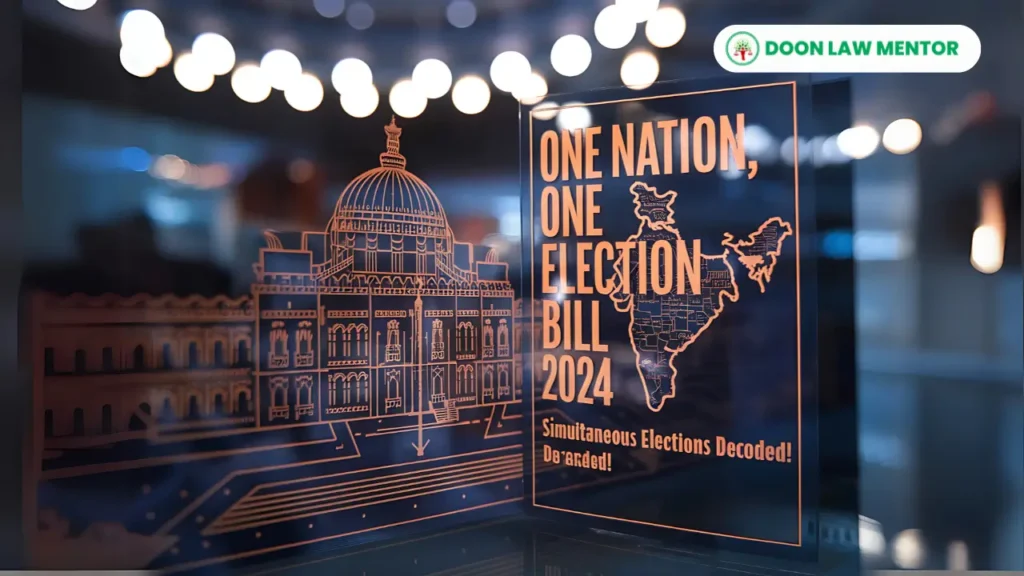INTRODUCTION
The Constitution (One Hundred and Twenty-Ninth Amendment) Bill, 2024, popularly referred to as the One Nation One Election Bill, is set to be a historic reform in India’s electoral process. With this Bill, the government aims to synchronize elections for the Lok Sabha and State Legislative Assemblies to streamline governance and reduce the disruption caused by frequent elections.
Introduced by Arjun Ram Meghwal, the Minister of State for Law & Justice and Parliamentary Affairs, this Bill will likely be tabled during the winter session of Parliament 2024. Let’s delve into the key features, proposed amendments, and implications of this significant legislation.
Key Features of the Bill
1. Insertion of Article 82A: Simultaneous Elections
The Bill proposes the addition of Article 82A to the Constitution of India, enabling simultaneous elections for the Lok Sabha and all Legislative Assemblies.
- Definition: General elections conducted simultaneously for the Lok Sabha and all State Legislative Assemblies.
- Appointed Date: The President will issue a public notification marking the beginning of the simultaneous election process after the first sitting of the newly elected Lok Sabha.
- Unified Terms: Once the notification is issued, all State Legislative Assemblies elected after the appointed date will automatically align their term to expire on the same day as the Lok Sabha’s full term.
2. Election Deferment Under Special Circumstances
If the Election Commission of India (ECI) determines that elections to a particular State Assembly cannot be held concurrently with the Lok Sabha elections, the Commission may recommend deferring the Assembly elections.
- Despite deferment, the Assembly’s full term will end simultaneously with the Lok Sabha’s term.
3. Mid-Term Elections for Unexpired Terms
In case the Lok Sabha is dissolved before its full term, the Bill introduces clauses in Article 83 and Article 172 to address “mid-term elections.”
- Lok Sabha: A mid-term election will be conducted, and the new Lok Sabha will serve only for the unexpired term of five years.
- State Assemblies: Similar provisions will apply to Legislative Assemblies if they are dissolved early.
4. Alignment with Union Territories
The Union Territories Law (Amendment) Bill, 2024, proposes amendments to the Government of Union Territories Act, 1963, National Capital Territory Act, 1991, and Jammu & Kashmir Reorganisation Act, 2019 to align these territories with the simultaneous and mid-term election framework.
Statement of Objects and Reasons
The government justifies the need for simultaneous elections, citing the following reasons:
- Reducing Frequent Imposition of the Model Code of Conduct (MCC):
The MCC disrupts developmental projects, affects public services, and diverts administrative resources. - Streamlining Governance:
Conducting elections in a staggered manner leads to policy discontinuity and administrative delays. - Cutting Election Expenditure:
Frequent elections result in higher costs for conducting polls. - Focus on Core Duties:
The redeployment of personnel for election duties affects essential services and governance.
High-Level Committee Recommendations
In March 2024, the High-Level Committee chaired by former President Ram Nath Kovind submitted a comprehensive report advocating for simultaneous elections to the Lok Sabha, State Legislative Assemblies, and local bodies. Key highlights of the report:
- Legal amendments are required to ensure synchronized elections.
- Greater efficiency in governance will be achieved through unified election cycles.
- The logistical challenges of simultaneous elections can be overcome with robust planning.
Legal Amendments Proposed
1. Article 82A
Simultaneous elections will be governed under this new Article. It lays down:
- Election Timing: The ECI will ensure simultaneous elections to the Lok Sabha and State Assemblies before their terms expire.
- Flexibility: The President can defer Assembly elections on the recommendation of the ECI.
2. Article 83 and Article 172
Both Articles will include new provisions for handling mid-term elections and aligning the terms of the Lok Sabha and State Assemblies.
3. Article 327
This amendment empowers Parliament to make uniform laws for synchronized elections across the country.
Potential Challenges
While the Bill offers numerous benefits, it also faces significant challenges:
- Legal Hurdles:
Constitutional amendments will require a two-thirds majority in Parliament and ratification by at least 50% of the State Legislatures. - Operational Complexity:
Conducting elections across India on the same day will require extensive resources and planning. - Political Resistance:
Opponents argue that simultaneous elections might undermine regional parties and over-centralize power. - Impact on Democratic Processes:
Critics fear that combining national and state elections could lead to issues being overshadowed by national narratives, reducing voter focus on local governance.
Global Perspective
Countries like South Africa and Sweden conduct simultaneous elections, ensuring policy stability and cost efficiency. However, their smaller geographical size and simpler administrative structures make the process easier to manage than in a vast democracy like India.
FAQs on One Nation, One Election
1. What is the ‘One Nation One Election’ Bill?
The Bill proposes simultaneous elections for the Lok Sabha and State Legislative Assemblies by aligning their terms.
2. How does the Bill achieve synchronization of elections?
The Bill inserts Article 82A and amends Articles 83, 172, and 327, ensuring that elections are conducted simultaneously.
3. Why is there opposition to the Bill?
Critics argue it could undermine regional parties, increase operational challenges, and reduce voter focus on local governance.
4. What are the benefits of One Nation, One Election?
Key advantages include reducing election costs, minimizing policy disruptions caused by frequent imposition of the MCC, and streamlining governance.
5. Has this idea been proposed before?
Yes, the idea was first discussed during Jawaharlal Nehru’s tenure, and elections were held simultaneously until 1967.
Conclusion
The One Nation, One Election Bill, 2024 is a bold and transformative step towards electoral reform in India. By proposing simultaneous elections, it addresses long-standing concerns about governance inefficiencies, policy disruptions, and escalating election costs.
While the benefits of this reform are significant, its successful implementation will require addressing operational, legal, and political challenges. As the Bill moves forward in Parliament, it will undoubtedly spark nationwide debates on its implications for India’s democracy.
For further reading, explore the Constitution of India and the Election Commission of India’s guidelines.
OneNationOneElection, #ElectoralReform, #LokSabhaElections, #IndianConstitution, #SimultaneousElections, #OneIndiaOneVote #ConstitutionofIndia #DoonLawMentor



